- Articles: Interview: Karen Joy Fowler, by Clinton Lawrence –
- From Victoria Schwab to Justina Robson: The best female science fiction and fantasy writers you should read now – Features – Books – The Independent –
- The Hugo Awards (2014-2015) –
- Nominate Your Favorite Works And People For The 2015 Hugo Awards –
- Hug a Critic (Or Nominate them for an Award) « Once & Future –
Linky-Linky
Tracking with closeups (February 4th through March 3rd)
- Semiprozine Directory | Semiprozine.org –
- Approaching Pavonis Mons by balloon: Asimov’s Science Fiction – February 2015 – Reading this piece, I was struck by the sense – which I think has also been articulated by Gardner Dozois – that we're starting to see the emergence of what you might call the "New Default Future". Bear's world is one of vanishing privacy, information for all, continued social inequality, climate change as a given, radical lifestyle changes effected by new biotechnology. You can tweak the parameters a bit, but it does seem as if writers are once again beginning to converge on a shared sense of the future. No, it doesn't necessarily involve space colonies or rolling roads or flying cars, but it's no less valid, no less fascinating.
- We Need Diverse Books Authors Take on Publishing, Reader Prejudice – Flavorwire – A few weeks later We Need Diverse Books, the social media movement that has grown into a well-regarded nonprofit in a matter of months, was born. The founders had already started planning their campaign when, not for the last time, an incident of industry racism gave them momentum. In April, BookCon — a subsidiary of New York-based publishing mega-conference BookExpo — announced a panel of superstar children’s authors that consisted of all white men, while the overall conference lineup was all white people, aside from Grumpy Cat.
- GUEST POST: Elizabeth Bear on “Strong Female Characters” « Intellectus Speculativus – Specifically, my problem is that the idea that a female lead must be a “strong female character” leads to a whole complex of other problems. So here’s an inexhaustive survey of some of them, and some suggestions on how to avoid the traps.
- Conventional Wisdom by Arthur Drooker – Cool Hunting – This time, people are the focus of his lens for "Conventional Wisdom." Drooker plans on attending conventions across the United States to capture the inner-workings of dedicated, passionate and sometimes surprising, communities, all in service to his next proposed book. We're excited to share exclusive sneak peeks from his explorations, as the "Conventional Wisdom" trek unfolds.
Tracking with closeups (January 16th through February 2nd)
- Borderlands Books : Used&New Science Fiction, Fantasy&Horror – In November, San Francisco voters overwhelmingly passed a measure that will increase the minimum wage within the city to $15 per hour by 2018. Although all of us at Borderlands support the concept of a living wage in principal and we believe that it's possible that the new law will be good for San Francisco — Borderlands Books as it exists is not a financially viable business if subject to that minimum wage. Consequently we will be closing our doors no later than March 31st.
- Locus Online – posts from Locus Magazine » 2014 Locus Recommended Reading List – This Recommended Reading List, published in Locus Magazine’s February 2015 issue, is a consensus by Locus editors and reviewers — Liza Groen Trombi, Gary K. Wolfe, Jonathan Strahan, Faren Miller, Russell Letson, Graham Sleight, Adrienne Martini, Carolyn Cushman, Tim Pratt, Karen Burnham, Gardner Dozois, Rich Horton, Paul Kincaid, and others — with inputs from outside reviewers, other professional critics, other lists, etc. Short fiction selections are based on material from Jonathan Strahan, Gardner Dozois, Rich Horton, Lois Tilton, Ellen Datlow, Alisa Krasnostein, and Paula Guran with some assistance from Karen Burnham, Nisi Shawl, and Mark Kelly.
- Seanan’s Tumblr | Do you get royalties on used books, or are they… – Let’s return to the used book ecosystem for a moment. When you buy a used book from my local Half-Price Books, no, I don’t get royalties. But the store pays its rent. People are employed. The lights stay on. People who need money can sell their books to the store to be sold to other people looking for a little joy. A used book is joy magnified. It is something paid forward into the world. A pirated book is a dead end.
- Morning Star :: Fantastically profound – Joyce was intensely proud of his roots and once said: “I’ve taken a conscious decision to explore the lives of people who are still ignored by a majority of writers.” He enjoyed his success but expressed sadness at feeling “educated out” of the environment and culture into which he was born.
- This is a jar full of major characters … | Time-Machine? Yeah! – Actually it is a jar full of chocolate covered raisins on top of a dirty TV tray. But pretend the raisins are interesting and well rounded fictional characters with significant roles in their stories.
Tracking with closeups (January 15th)
- Amazon.com: The Man in the High Castle [HD]: Amazon Instant Video – Free pilot of the television series
- Sleeps With Monsters: I Want More of Everything I Like | Tor.com – I’ve spent the past little while, in fact, dwelling on the kinds of books I’ve read (and reread) in the last year, and considering the kinds of books I would give a wisdom tooth to see more of.
- Survey on Translated Literature by University of Bristol | Europa SF – The European Speculative Fiction portal –
- Where to Start with Michael Moorcock’s Sci-Fi and Fantasy Multiverse — The B&N Sci-Fi and Fantasy Blog – If you ever needed an excuse to get familiar with the sci-fi/fantasy figurehead, this is it. Warning: Michael Moorcock fans must have a sturdy set of bookshelves. Seventy novels take up a lot of space.
- Mind-Blowing Science Fiction And Fantasy Books To Watch Out For In 2015 – You'd better invest in a pocket dimension if you want to keep up with all the great reads that are coming your way in 2015. Including Alastair Reynolds, Naomi Novik, Neal Stephenson, and tons more. Here are 60 essential science fiction and fantasy books coming out this year!
Future Gollancz SF Masterworks
Now here’s an interesting idea Joachim Boaz came up with: take the Gollancz SF masterworks series and see what books you’d add to it if you had the chance. It’s such a neat idea that I want to play as well.
The Gollancz Masterworks series has always been a more appealing idea in theory than in practise, limited as it is by such mundane considerations like who owns the rights to a specific novel or how well it may or may sell, but that doesn’t need to stop me. What I’ll do is see which writers unjustifiably have been left out of the list so far, which of their books should be included and why, keeping strictly to books published before 2000.
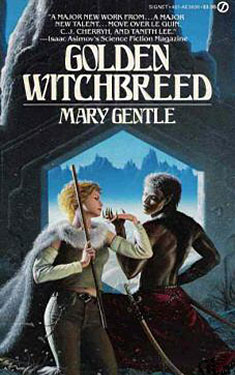
The first candidate I’d nominate is Mary Gentle. It’s incomprehensible to me that she’s been left out so far, unless it’s because she’s mostly thought of as a fantasy rather than a science fiction writer. Even so, Golden Witchbreed (1983) should be a no brainer for inclusion. It fits perfectly in that tradition of planetary romance established by writers like Leigh Brackett, Jack Vance, C. L. Moore and Ann McCaffrey, yet at the same time is a deconstruction of it and the colonial mindset that flows through much of the genre. It’s also perhaps the most straightforward, most accessible of Gentle’s novels, who usually has the reader working hard. If possible, the sequel, Ancient Light, which is more aggressive in its deconstruction, should also be included, perhaps with a foreword by somebody like Adam Roberts, in who I see a lot of Gentle influences.
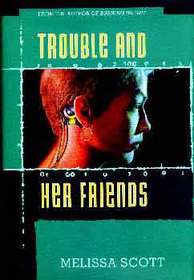
Cyberpunk has not been represented well in the Masterworks series, with not even Neuromancer included, just Lucias Shepard’s Life During Wartime. It’s a curious ommission to have such an important subgenre only represented by one book. You’d expect Neuromancer to be represented as for better or worse that’s the novel that shaped the genre the most, or perhaps Bruce Sterling’s Schismatrix for the road cyberpunk didn’t take, but I’d like to break a lance for another book. And that’s Melissa Scott’s Trouble and her Friends (1994). Published a bit late to be a cyberpunk pioneer, at a time when the internet was already going mainstream, it featured the usual sort of impractical but cool computer technology, but where it shines is in its treatment of politics. It’s one of the few cyberpunk novels that realised that even cyberspace politics matter, one of the few to predict the taming of the internet by commercial interests and the state as actually happened in real life. What’s more, it’s the only cyberpunk novel I know that takes seriously intra-cyberpunk politics, to know that there would be an incrowd and outsiders and to realise that quite likely, those outsiders outside of cyberspace — people of colour, LGBT people, etc — would be outsiders inside as well. In short, Scott predicted things like GamersGate.
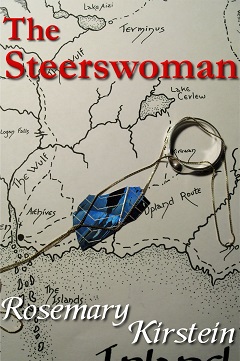
The Masterworks series has a good tradition of putting the spotlight on more obscure novels as well and one good candidate for this would be a novel I only this year discovered, Rosemary Kirstein’s The Steerswoman. This is a novel that’s at the heart of the science fiction genre yet almost unknown, one of the few stories that actually take seriously the idea of doing science, of finding out the shape of your world and discovering the scientific method in the process. It starts out looking as a fantasy novel, then slowly morphs into a novel of scientific discovery, one that never cheats and doesn’t depend on its audience knowing more than the protagonist. It’s also bloody well written, exciting and has three equally good sequels.
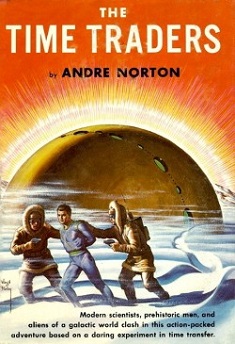
Who else is underrepresented in the Masterworks series compared to the influence she has had, is Andre Norton, somebody who e.g. Ann Leckie has named as an influence. Incredibly prolific, she’s written a lot of novels, so the problem here is chosing which ones to use. I’d go for an omnibus edition of her Time Traders series, four short novels of early sixties Cold War time travel derring do. Granted, these aren’t the best sf novels ever written, but they are influential books that inspired whole generations of readers. They’re typical of a whole current of science fiction that’s underrepresented today, that needs to be rehabilitated.
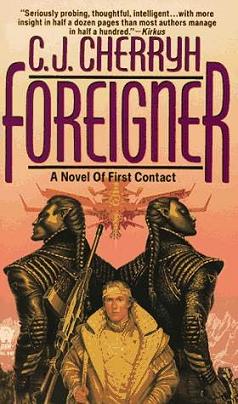
Another massively important science fiction writer not yet represented in the Gollancz SF Masterworks series is C. J. Cherryh, somebody who has been writing since the seventies, won the Hugo Award three times and has a friggin asteroid named after her. She needs including and there are several candidates for which novel to include and I like to make the case for Foreigner because it’s such a good showcase of what Cherryh does best. And what she does best is getting her usually young heroes in over their heads, out of their depth, acting on too little information, too little sleep, stressed out and with the fate of worlds riding on their actions. It’s a formula you’ll find in many if not most of her stories and it’s nowhere else shown so clearly as in Foreigner.
So those are my five choices for new entries in the SF Masterworks series. For better suggestions, go visit: